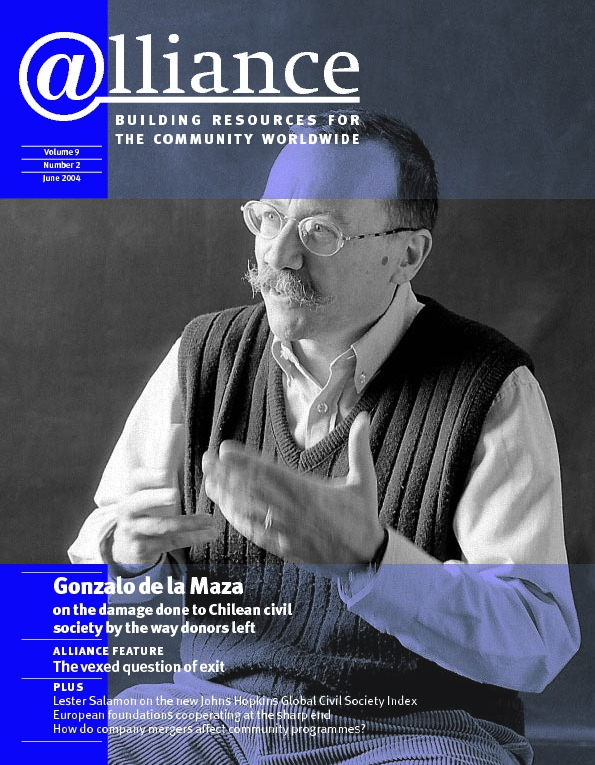When exiting a country, foreign donors inevitably create a vacuum in funding for certain types of organizations and certain areas of NGO work. Several contributors to this issue of Alliance emphasize that it is important for key donors to think strategically not just about the sustainability of their grantees but also of the civil society sector as a whole when planning an exit strategy.
A major challenge in such an overarching strategy is to find ‘replacement’ funding for the areas of NGO and community work that had until then been supported by such key donors. Those supported may include advocacy organizations as well as NGOs providing alternative services, grassroots organizations as well as local grant-giving foundations, policy think-tanks as well as community organizations – in other words, NGOs and work that are best financed from independent domestic sources rather than government if they are to retain organizational autonomy and independence.
Yet, both exiting donors and NGOs often turn to government as a ‘substitute’, and do so quite naturally since the government budget is the single major readily available source of funds in the country. A common element of sector sustainability strategies is to lobby for more direct state support – a more tangible objective than the uncertain aim of promoting private philanthropy. Unfortunately, the last 10–15 years were not enough for the development of a widespread philanthropic culture that could consistently finance even a segment of NGOs, and it may take the same amount of time again to see real progress.
However, the experience of transitioning countries suggests that government funding almost always comes with a series of political strings attached and may lead to as much dependency as foreign funding. It is not only philanthropic culture that has not yet developed in Central and Eastern Europe (CEE) – neither has a culture of government transparency and accountability, or party-political neutrality on the part of public officials. If provided through the traditional channels of subsidies and grants from the various ministries, increased state support is therefore unlikely to help solve the sustainability problem.
At the same time, a number of initiatives in CEE countries in the last few years have opened up a new direction in public funding. They have identified innovative mechanisms that tap into government funding (as the major potential source of ‘replacement’ funds) in a way that aims to ensure both independence of NGOs and sustainability of the financial source. The essence of these mechanisms, although developed largely independently from each other, is that the government should commit a given amount of funding for sector development and ‘outsource’ decision-making over who receives the funding. These are CEE versions of the ‘arms-length’ principle that exists in several developed countries.
Examples include tax designation mechanisms (introduced first in Hungary, now existing in six CEE countries),[1] the endowment of private foundations from privatization income (the Czech model), matched funds from central government for local community foundations (planned in Latvia) and a national grantmaking fund governed by elected NGO representatives (Hungary). Croatia (and even South Africa) has also established a semi-independent central fund to support the development of the sector.
In some way, all these mechanisms contain the ‘untraditional’ element of government giving up its control over public funds and letting taxpayers or NGOs themselves decide directly about their allocation. Which of these actually serve third sector development (and to what extent) is a question yet to be answered.
Each of these mechanisms has pros and cons, and none is a panacea for all the problems in funding the non-profit sector in transitioning countries. The problems stem from an inherent lack of structural and cultural elements (eg indigenous private grant-giving foundations or individual giving) for financing the sector, and will not be overcome until those elements develop sufficiently to sustain a strong and autonomous sector. However, these ‘hybrid’ mechanisms may serve as a bridge to the development of the pieces that are lacking. The tax designation mechanism, for example, is believed to enhance philanthropic behaviour, while endowing local grantmaking foundations sows the seeds of independent grantmakers.
It will take a few more years before we can draw any conclusions about the impact of these mechanisms, but the lessons learnt from their design and implementation are likely to be valuable to other transitioning and developing countries.
1 According to this mechanism, individual taxpayers have the right to designate a small percentage of their taxes to a qualifying NGO. Currently, this is 2 per cent in Hungary (1 per cent for NGOs and 1 per cent for churches), 2 per cent in Slovakia (open to individual and company taxpayers), 2 per cent in Lithuania, and 1 per cent in Poland and Romania. See http://www.onepercent.hu
Nilda Bullain is Program Director of the European Center for Not-for-Profit Law. She can be contacted at nilda@ecnl.org.hu





Comments (0)